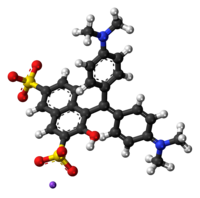Green S
 |
|
 |
|
| Names | |
|---|---|
|
IUPAC name
Sodium 4-[(4-dimethylaminophenyl)-(4-dimethylazaniumylidene-1-cyclohexa-2,5-dienylidene)methyl]-3-hydroxynaphthalene-2,7-disulfonate
|
|
| Other names
Food Green S; FD&C Green 4; Acid green 50; Lissamine Green B; Wool Green S; C.I. 44090; E142
|
|
| Identifiers | |
|
3087-16-9 |
|
| 3D model (Jmol) | Interactive image |
| ChemSpider |
82646 |
| ECHA InfoCard | 100.019.463 |
| E number | E142 (colours) |
| PubChem | 91525 |
| UNII |
9B7E8Y9D0X |
|
|
|
|
| Properties | |
| C27H25N2NaO7S2 | |
| Molar mass | 576.62 g/mol |
| Melting point | 210 °C (410 °F; 483 K) (decomposes) |
| Hazards | |
| R-phrases | R22 |
|
Except where otherwise noted, data are given for materials in their standard state (at 25 °C [77 °F], 100 kPa).
|
|
|
|
|
| Infobox references | |
Green S is a green synthetic coal tar triarylmethane dye with the molecular formula C27H25N2O7S2Na.
As a food dye, it has E number E142. It can be used in mint sauce, desserts, gravy granules, sweets, ice creams, and tinned peas. Green S is prohibited as a food additive in Canada, United States, Japan, and Norway. It is approved for use as a food additive in the EU and Australia and New Zealand.
Green S is a vital dye, meaning it can be used to stain living cells. It is used in ophthalmology, among fluorescein and rose bengal, to diagnose various disorders of the eye's surface.
Green S may cause allergic reactions and is one of the colorants that the Hyperactive Children's Support Group recommends to be eliminated from the diet of children.
...
Wikipedia
